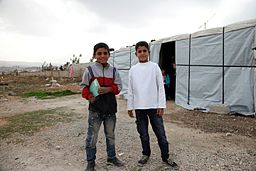5 Reasons the U.S. Needs to Help Syrian Refugees
I don’t usually write political posts, but all the controversy over whether to admit Syrian refugees into the U.S. has caused these thoughts to be burning on my heart. My day job is as a writer for an international humanitarian organization that cares for people in need, like these refugees. It breaks my heart that with all the privileges and comforts that Americans have, we would let our fear make us lose our compassion for people who are desperate.
1) When we talk about the Holocaust, we always say “We can never let this happen again.” But if we let our fear today cause us to treat Syrian refugees the same way the U.S. treated Jewish refugees during WWII, we have no moral high ground to judge. How many Jewish lives could have been saved if we’d opened our doors? How many Syrian lives can we save now?
2) I get the fear of letting in terrorists, but we need to think this through and look at the facts. Per the International Rescue Committee, a respected relief organization: “Refugees are the most security vetted population who come to the United States. Security screenings are rigorous and involve the Department of Homeland Security, the FBI and the Department of Defense.” And clearly, our vetting is working. Of the 1.5 million refugees from the Middle East that the U.S. has admitted since 9/11, exactly ZERO have been involved in a terrorist acts. Should we lose our humanity in our fear?
3) I get the sentiment of “But we need to help our own homeless and our disabled vets.” But how does helping refugees take away from our ability to help others in need? Who has suggested that if we help refugees, we’ll stop helping anyone else? Compassion is not a zero sum activity.
4) For those of you who are Christians, the Bible is pretty clear about how we are to treat those in need. “Now this was the sin of your sister Sodom: She and her daughters were arrogant, overfed and unconcerned; they did not help the poor and needy.” (Ezekiel 16:49)
5) Caring for refugees, giving them hope that they can rebuild their lives, is much more likely to make them productive members of society. Without that hope, who knows what sort of extremism they’ll turn to?
